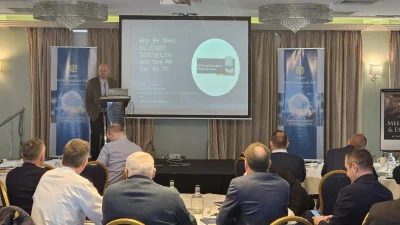
Newsletter Subscribe
Enter your email address below and subscribe to our newsletter

Enter your email address below and subscribe to our newsletter

Dr. Rob Gillanders, Co-Director of the DCU Anti-Corruption Research Centre (DCU ARC), recently addressed senior managers at An Garda Síochána’s Anti-Corruption Unit, delivering a critical message: Ireland’s fight against corruption has been a challenging one, but with the right strategies, progress is possible.
Gillanders’ presentation highlighted both the opportunities and the long-standing obstacles in tackling corruption effectively. While recent efforts are commendable, he didn’t shy away from the reality that past anti-corruption measures in Ireland have fallen short.
Ireland has grappled with corruption scandals for decades, often involving high-profile individuals and institutions. Despite numerous inquiries and policy proposals, enforcement and long-term impact have been inconsistent.
From the banking scandals to planning irregularities, corruption has been a persistent issue. Critics argue that a lack of robust enforcement mechanisms and political will has allowed corruption to thrive.
Dr. Gillanders’ engagement with An Garda Síochána’s Anti-Corruption Unit comes at a time when the public demands greater accountability from both public and private institutions. His message was clear: to win the fight against corruption, Ireland must learn from past failures and implement evidence-based policies that work in practice, not just on paper.
Reflecting on his presentation, Dr. Gillanders shared a realistic yet hopeful perspective. “We can fight corruption, but it is hard. Insights from social science, including economics, can give us good guidance as to what can work and tell us what works best,” he said.
Gillanders emphasized the importance of understanding why certain anti-corruption measures have failed in the past—whether due to lack of enforcement, political interference, or weak institutional frameworks—to avoid repeating the same mistakes.
The DCU Anti-Corruption Research Centre (DCU ARC) is the first academic research hub in Ireland solely dedicated to studying corruption and anti-corruption efforts. Based at Dublin City University, the centre brings together experts from various fields to tackle this complex issue.
DCU ARC’s mission is to understand corruption’s causes and consequences while promoting innovative strategies to address it. The centre works closely with policymakers and law enforcement agencies to ensure that its research translates into effective, actionable policies.
Dr. Gillanders’ collaboration with An Garda Síochána underscores the need for a stronger bridge between academic research and real-world implementation.
His engagement signals a shift in Ireland’s approach to fighting corruption—one that acknowledges past shortcomings and prioritizes evidence-based solutions. The goal is to create long-term change by addressing systemic issues that have allowed corruption to persist.
Ireland’s anti-corruption efforts have often been reactive rather than proactive. Dr. Gillanders’ presentation serves as a reminder that without sustained commitment and accountability, corruption will continue to undermine public trust.
To ensure meaningful progress, institutions must move beyond symbolic gestures and invest in robust anti-corruption frameworks that endure over time.
To learn more about the important work DCU ARC is doing to shape Ireland’s anti-corruption future, visit their website: DCU ARC.